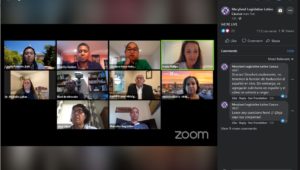![]()
As COVID-19 rates within the Latino population in Baltimore City continue to rise, government officials have turned to Catholic Charities’ Esperanza Center for insight and expertise, recognizing the powerful ways the center has responded to the community’s shifting needs.
Katie Phillips, Esperanza’s clinic manager, participated in two recent briefings for public sector leaders.
The first was hosted by a group of local, state, and federal agencies in late July, after Dr. Deborah Birx, a leader of the White House Coronavirus Task Force, raised concerns about rising positivity rates in several U.S. cities, including Baltimore. Phillips was part of a conversation focused on the pandemic’s impacts on vulnerable populations.
The Maryland Legislative Latino Caucus organized the second briefing this week to highlight the particular challenges of and responses to the Latino population across the state. Phillips joined speakers from Johns Hopkins Medicine, CASA, and the Maryland Department of Health to explain what Esperanza staff have seen on the ground as they provide a range of services. She focused particularly on solidifying support for a multi-lingual health hotline established in March to provide information on COVID-19 and connect callers to testing and other resources. The hotline was “strung together” with temporary funding, and Esperanza never expected the need would continue for more than a couple of months, she said.
“We’ve been blown away. We fielded more than 3,000 calls since the hotline started, and it’s been increasingly busy,” she told the briefing, hosted on Zoom and over Facebook Live.

Katie Phillips, clinic manager at the Esperanza Center, shares her insight with the Maryland Latino Caucus in early August.
More than 97,000 people have tested positive for COVID-19 in Maryland, over 24,000 (or about a quarter) of whom are Hispanic, according to state data. Of the nearly 13,000 cases in Baltimore City, over 1,800 (nearly 14 percent) are in the 21224 ZIP code. That’s both a key service area for the Esperanza Center – a comprehensive resource center for immigrants – and where the clinic organized a weekly testing site earlier this year in the parking lot of the Sacred Heart of Jesus church in partnership with Johns Hopkins.
Phillips said the briefings are valuable ways to raise awareness of what Esperanza staff have seen through their programs and relationships.
“We just really need to call attention to the challenges that are facing this community, and share the work we are doing,” she said. “We think there are gaps in service.”
Particular challenges that lead to particular vulnerabilities
The Latino community faces particular challenges related to COVID-19. Many work in essential jobs that must be done in person and that don’t offer workplace protections, including paid sick leave. Many live in crowded housing, with multiple individuals or families sharing a rowhouse with one bathroom. And those who are undocumented were left with “no safety net whatsoever,” Phillips said.
“At the beginning of [the pandemic], the message was to work remotely and stay home – and that was just not an option for this community,” she told the Latino Caucus event. “We knew that they were not receiving any of the economic safety net provisions that were put in place. There was no access to unemployment benefits for many in this community. There was no stimulus check. There was no paid sick leave. And they often have these tenuous employment relationships where if they don’t show up for work they will lose their jobs.”
In addition to establishing a hotline and organizing more extensive testing, the Esperanza Center launched new initiatives to respond to the community’s evolving needs, including delivering food to people who tested positive for COVID-19 so they would not have to leave their homes.
“It’s a moment for Esperanza Center generally, not just the clinic,” Phillips said, describing the staff’s collective efforts to highlight how health can be affected by housing, employment, legal status, and other concerns. “What makes us unique is that we have all these programs under one roof.”
